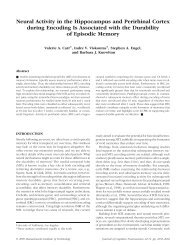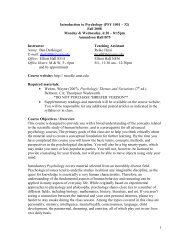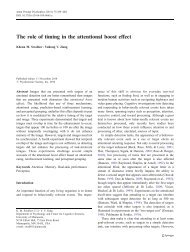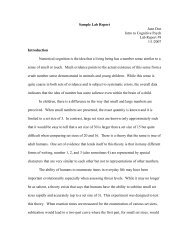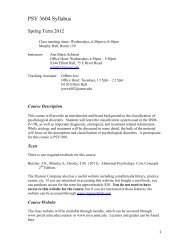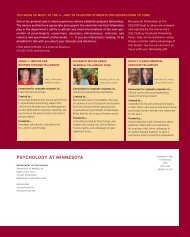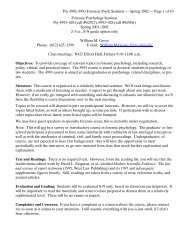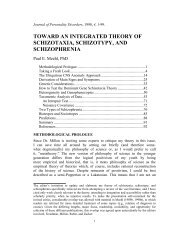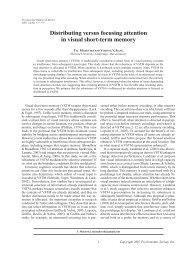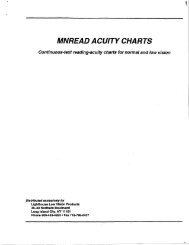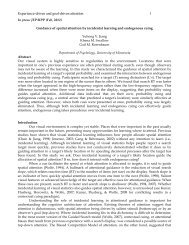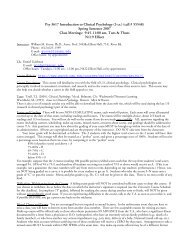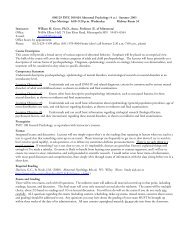PSY 3051: Introduction to Cognitive Psychology - University of ...
PSY 3051: Introduction to Cognitive Psychology - University of ...
PSY 3051: Introduction to Cognitive Psychology - University of ...
You also want an ePaper? Increase the reach of your titles
YUMPU automatically turns print PDFs into web optimized ePapers that Google loves.
Midterm 1 (16%) will be administered in-class on Thursday, Oc<strong>to</strong>ber 20, which will test yourknowledge <strong>of</strong> materials covered from Sep 7 th <strong>to</strong> Oct 18 th . Midterm 2 (16%) will beadministered in-class on Tuesday, November 22, which will test your knowledge <strong>of</strong> materialscovered from Oct 25 th <strong>to</strong> November 17 th . The final exam (36%) will be administered in-class onThursday, December 22 from 8-10am and will cover materials from the entire course. Makeupexams will not be granted except with signed verification from the Office for StudentAffairs with legitimate excuse. You should not register in this course if you will be unavailablefor the exam dates listed above.2. (12%) Three lab reportsWe will conduct in-class labs three times during the semester. You will divide in<strong>to</strong> subgroups<strong>of</strong> 3 <strong>to</strong> conduct classical cognitive experiments. Data from the class will be averaged for you <strong>to</strong>write a lab report. This will be short description <strong>of</strong> what you have found and what you think itmeans (word limit: 500 words, inclusive <strong>of</strong> all text). Lab reports are due at 9:45am one-weekafter the lab session. Each lab report will be graded on a 10-point scale and counts 4% <strong>to</strong>wardyour final grade. Late submission will cost 1-point (out <strong>of</strong> the 10) per day.3. (20%) 22 Quiz and 4 attendanceWe will take class attendance four times: the first class and each <strong>of</strong> the 3 labs. In addition, therewill be one quiz for each <strong>of</strong> the other 22 lectures, which must be submitted in that lecture’sclass. Each attendance or each correct response <strong>to</strong> a quiz will give you 1%, for a maximum <strong>of</strong>20%. Perfect record (all 4 attendance and all 22 correct answers <strong>to</strong> the quiz) will earn you anextra 2% bonus <strong>to</strong>ward your final score.TextbookLectures will be drawn from a wide array <strong>of</strong> materials, and consequently they do not significantlyoverlap with any existing textbooks. However, readings will be assigned from chapters in thefollowing textbook:Reisberg, Daniel (2009). Cognition: Exploring the science <strong>of</strong> the mind. (4 th edition). Note: 2 nd and 3 rdeditions are acceptable.In addition, for each class we will assign a related journal article for you <strong>to</strong> read. Readings are linked<strong>to</strong> this syllabus! Exam materials may be drawn from the journal articles.Additional readingsSupplementary readings will be drawn from the scientific literature and linked <strong>to</strong> the course web site.The following book is a good reference for brain-related materials:Gazzaniga, M.S., Ivry R.B., Mangun G.R. (2008). Cognition Neuroscience: The Biology <strong>of</strong> the Mind(3 rd edition; GIM). [2 nd edition is informative <strong>to</strong>o].Both the Reisberg book and the GIM can be purchased at from the web. Used copies and older editionsare acceptable.Preliminary course outlinesFall 2011 <strong>PSY</strong> <strong>3051</strong> at umn.edu2Intro <strong>to</strong> <strong>Cognitive</strong> <strong>Psychology</strong>



